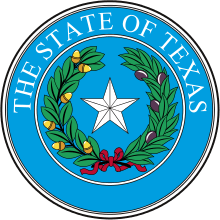Texas Legislature
| Texas State Legislature | |
|---|---|
 | |
| Type | |
| Type | |
| Houses |
Senate House of Representatives |
| Leadership | |
| Structure | |
| Seats |
181 voting members: 31 Senators 150 Representatives |
 | |
Senate political groups |
Republican (20) Democratic (11) |
|
| |
House political groups |
Republican (99) Democratic (48) Vacant (2) |
| Elections | |
Senate last election | November 4, 2014 |
| Meeting place | |
|
| |
| Texas State Capitol, Austin | |
| Website | |
| http://www.capitol.state.tx.us | |
The Legislature of the state of Texas is the state legislature of Texas. The legislature is a bicameral body composed of a 31-member Senate and a 150-member House of Representatives. The state legislature meets at the Capitol in Austin. It is a powerful arm of the Texas government not only because of its power of the purse to control and direct the activities of state government and the strong constitutional connections between it and the Lieutenant Governor of Texas, but also due to Texas's plural executive.
The Legislature is the constitutional successor of the Congress of the Republic of Texas since Texas's 1845 entrance into the Union. The Legislature held its first regular session from February 16 to May 13, 1846.
Structure and operations
The Texas Legislature meets in regular session on the second Tuesday in January of each odd-numbered year.[1] The Texas Constitution limits the regular session to 140 calendar days. The lieutenant governor, elected statewide separately from the governor, presides over the Senate, while the Speaker of the House is elected from that body by its members. Both have wide latitude in choosing committee membership in their respective houses and have a large impact on lawmaking in the state.
Only the governor may call the Legislature into special sessions, unlike other states where the legislature may call itself into session. The governor may call as many sessions as he or she desires. For example, Governor Rick Perry called three consecutive sessions to address the 2003 Texas congressional redistricting. The Texas Constitution limits the duration of each special session to 30 days; lawmakers may consider only those issues designated by the governor in his "call," or proclamation convening the special session (though other issues may be added by the Governor during a session).
Any bill passed by the Legislature takes effect 90 days after its passage unless two-thirds of each house votes to give the bill either immediate effect or earlier effect. The Legislature may provide for an effective date that is after the 90th day. Under current legislative practice, most bills are given an effective date of September 1 in odd-numbered years (September 1 is the start of the state's fiscal year).
Although members are elected on partisan ballots, both houses of the Legislature are officially organized on a nonpartisan basis, with members of both parties serving in leadership positions such as committee chairmanships. As of 2015, a majority of the members of each chamber are members of the Republican Party.
Qualification for service
The Texas Constitution sets the qualifications for election to each house as follows:[2]
- A senator must be at least 26 years of age, a citizen of Texas five years prior to election and a resident of the district from which elected one year prior to election. Each senator serves a four-year term and one-half of the Senate membership is elected every two years in even-numbered years, with the exception that all the Senate seats are up for election for the first legislature following the decennial census in order to reflect the newly redrawn districts. After the initial election, the Senate is divided by lot into two classes, with one class having a re-election after two years and the other having a re-election after four years.
- A representative must be at least 21 years of age, a citizen of Texas for two years prior to election and a resident of the district from which elected one year prior to election. They are elected for two-year terms, running for re-election in even-numbered years.[3]
Neither the House of Representatives nor the Senate has term limits.
Salary of legislative officials
State legislators in Texas make $600 per month, or $7,200 per year, plus a per diem of $190 for every day the Legislature is in session (also including any special sessions). That adds up to $33,800 a year for a regular session (140 days), with the total pay for a two-year term being $41,000.[4][5]
Makeup of the Texas Senate

| Affiliation | Members | |
| Republican Party | 20 | |
| Democratic Party | 11 | |
| Total |
31 | |
Makeup of the Texas House of Representatives

| Affiliation | Members | |
| Republican Party | 99 | |
| Democratic Party | 48 | |
| Vacant | 2 | |
| Total |
150 | |
Support agencies
The Texas Legislature has five support agencies that are within the legislative branch of state government.
Those five agencies are:
- Texas Legislative Budget Board;
- Texas Legislative Council;
- Texas Legislative Reference Library;
- Texas State Auditor; and
- Texas Sunset Advisory Commission
Scandals
- On May 14, 2007, CBS Austin affiliate KEYE reported on the rampant multiple voting by members of the Texas House of Representatives during a voting session.[6] The report noted how representatives would race to the nearest empty seats to register votes for absent members on the legislature's automated voting machines. Each representative would vote for the nearest absent members, apparently regardless of party affiliation. This practice was in direct violation of a Rule of the Texas Legislature; however, no house member had ever been disciplined for the practice. The then-Speaker of the House Tom Craddick, responsible for enforcement of the rule, issued a statement that discipline for violations of the rule is left to the individual house members.[6]
See also
References
- ↑ Texas Government Code 301.001
- ↑ "Qualifications for Office". Sos.state.tx.us. Retrieved 2016-02-25.
- ↑ Texas House of Representatives – Frequently Asked Questions
- ↑ "THE TEXAS CONSTITUTION ARTICLE 3. LEGISLATIVE DEPARTMENT". Statutes.legis.state.tx.us. Retrieved 2016-02-25.
- ↑ "Chapter 50, Ethics Commission Rules". Ethics.state.tx.us. Retrieved 2016-02-25.
- 1 2 CBS Channel 42 KeyeTV Investigates: One Lawmaker, Many Votes?, May 14, 2007, available at "https://www.youtube.com/watch?v=eG6X-xtVask"; see also Wilson, Nanci, One Lawmaker, Many Votes?, May 14, 2007, available at "www.keyetv.com/topstories/local_story_134224129.html"
Further reading
- "Citizen Handbook". The Senate of Texas. Retrieved 13 September 2009.
- Texas Legislature from the Handbook of Texas Online. Retrieved 13 April 2005.
- Stanley K. Young, Texas Legislative Handbook (1973).
- Univ. of Tex., The Legislative Branch in Texas Politics, (last accessed Oct. 8, 2006) (stating that "The Texas Legislature is the most powerful of the three main branches of government[,]" primarily because it is "less weak than the other branches").
- See also: Texas Government Newsletter
External links
- Texas Legislature Online
- Texas House of Representatives
- Texas Senate
- Reference Library of Texas
- Open Government Texas from the Sunlight Foundation
- Texas at Project Vote Smart
- Texas Politics – The Legislative Branch
- Texas Government Newsletter and Voter's Guide to the Texas Legislature
- Billhop – Texas Legislative Wiki